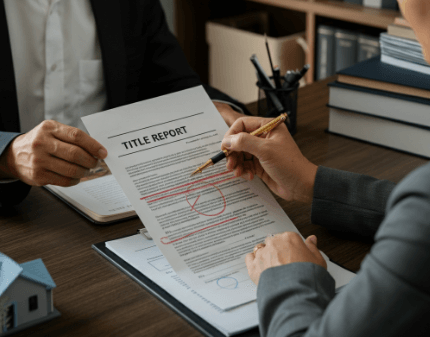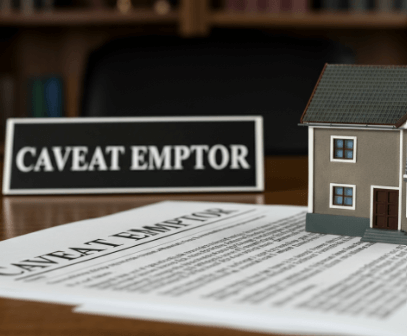What does Caveat Emptor mean? ‘Caveat emptor,’ which translates to ‘buyer beware,’ is a principle that serves as a stark reminder for purchasers to exercise caution, conduct thorough due diligence, and accept the risks associated with a purchase. The Sunshine State is known for its beaches, amusement parks, and vibrant real estate market in Florida. Understanding the principle of “What does Caveat Emptor mean?” is crucial for anyone looking to invest in property.
But what does Caveat Emptor mean, and why is it particularly significant in Florida’s real estate landscape? This blog aims to demystify this legal doctrine, exploring its implications for buyers in the sunny climes of Florida and providing insights into navigating property purchases with confidence and caution in a state where buyer beware takes on a whole new meaning.
Steve Daria and Joleigh, seasoned real estate investors, have successfully navigated Florida’s property market thanks to their deep understanding of the caveat emptor principle. Their experiences highlight the crucial role of comprehensive due diligence in the decision-making process for buyers in Florida’s diverse real estate market.
What does Caveat Emptor mean?
“Caveat emptor,” or “buyer beware,” is a foundational principle entrenched in the fabric of the U.S. legal system, with its origins deeply rooted in English common law.
Under this age-old doctrine, the responsibility for uncovering any defects or shortcomings in a property falls squarely on the shoulders of the buyer.
On the other hand, sellers typically bear no obligation to volunteer information regarding any issues with the property unless they directly impact its value or significantly influence the buyer’s decision to proceed with the purchase.

This principle places the burden of discovery on the buyer, emphasizing the importance of thorough due diligence before entering any property transaction.
It underscores the notion that buyers should exercise prudence and diligence in assessing the property’s condition and suitability.
Caveat Emptor in Legislation
Despite the age of this doctrine, “caveat emptor” has made its way into statutes as well, such as Florida’s real estate laws, where it is still an essential part of the legal and transactional landscape.
However, the extent to which it applies varies and doesn’t preclude sellers from remaining wholly silent on the condition of a property.
The Application of Caveat Emptor
Understanding ‘what does caveat emptor mean” and how caveat emptor is applied in real estate transactions is essential—it’s reassuring.
In Florida, this doctrine is balanced with provisions that protect buyers when disclosing property defects, ensuring a fair and informed transaction.
Seller’s Duty to Disclose
Florida law requires sellers to reveal known material defects that aren’t readily observable, which could significantly affect the property’s value or desirability.
These might include issues with the structure, plumbing, or any ongoing legal disputes regarding the property.
The Buyer’s Role
Buyers must also take reasonable steps to evaluate the property, often through inspections and other due diligence.
Should a defect be discovered after closing, the buyer’s remedy could be contingent on whether the seller failed in their duty to disclose or if the buyer neglected their chance to inspect the property adequately.
Get An Offer Today, Sell In A Matter Of Days
Navigating Caveat Emptor In Real Estate Sales
Navigating the application of “caveat emptor” requires a strategic approach for buyers and sellers.
Sellers want to communicate all critical information without deterring buyers, while buyers strive to be fully informed without becoming anxious about the purchase.
Sellers Communication Strategy
Sellers should lean on transparency and honesty in their communications regarding their property.
A strategy to achieve this without scaring off potential buyers might involve pre-listing inspections and identifying and addressing issues before the property goes on the market.
Buyer Due Diligence
Buyers need to conduct thorough investigations.
This includes hiring inspectors knowledgeable about Florida-specific issues like hurricane damage and flood zones.
Investing in a qualified real estate attorney can help interpret complex contracts and disclosure language.
The Evolution and Challenges of Caveat Emptor
Applying “caveat emptor” in real estate has evolved with time and legal precedents. Modern challenges include the rise of non-disclosure claims, especially concerning potential environmental hazards and title defects.
Environmental Caveats
Florida’s unique ecosystems and susceptibility to environmental hazards like sinkholes or algae blooms heighten the importance of understanding potential risks.
Buyers should research the land’s historical use for possible contamination and inquire about ecological surveys.
Title Defects
Issues with a property’s title can lead to significant problems. A vigilant buyer, supported by a comprehensive title search and insurance, can identify and address title defects early in the transaction process.

Leverage Caveat Emptor to Your Advantage
Leveraging the ‘caveat emptor’ principle can be a strategic advantage for consumers and professionals in Florida’s real estate market.
It ensures that transactions are conducted fairly and informally, safeguarding the interests of both buyers and sellers.
Legal Protection and Advice
Engaging professional counsel is not just a recommendation; it’s a crucial step in protecting your interests.
Attorneys can help structure deals to minimize potential liabilities and ensure the contract reflects the parties’ intent and agreement, providing protection and guidance.
Documentation and Record-keeping
Thorough documentation and record-keeping are essential for both buyers and sellers.
This includes maintaining all correspondence, transaction documents, and disclosures to protect interests in the property and present evidence should any disputes arise.
Pre-emptive Measures
Taking pre-emptive steps, such as understanding the ‘as-is’ sale concept and drafting solid contractual clauses that protect your interests, can preemptively address issues and potential disputes before they occur.
Caveat Emptor FAQs
We address frequently asked questions about “what does caveat emptor mean” to equip you with practical insights.
When does Caveat Emptor not apply in real estate transactions?
Caveat emptor may not apply if the seller conceals a material fact that the buyer cannot discover through reasonable inspection or inquiries.
How can sellers balance Caveat Emptor with disclosure laws in Florida?
Sellers can balance caveat emptor with disclosure laws by providing detailed disclosures at the outset of negotiations.
They should aim to be as transparent as possible to avoid concealment claims.
What are the typical remedies for buyers under Caveat Emptor?
Buyers may have various remedies under caveat emptor, including the right to rescind the contract, sue for damages, or demand that the seller rectify the issue.
Conclusion
In Florida’s dynamic and robust real estate market, the “caveat emptor” doctrine remains an influential guidepost for buyers and sellers alike. By understanding what does caveat emptor mean, its implications and intricacies, participants in real estate transactions can protect and advance their interests. Leveraging the power of “buyer beware” and coupling it with comprehensive due diligence is not just about legal compliance – it’s about making sound investments and establishing trust in a market that is as vibrant as it is vast.
**NOTICE: Please note that the content presented in this post is intended solely for informational and educational purposes. It should not be construed as legal or financial advice or relied upon as a replacement for consultation with a qualified attorney or CPA. For specific guidance on legal or financial matters, readers are encouraged to seek professional assistance from an attorney, CPA, or other appropriate professional regarding the subject matter.

